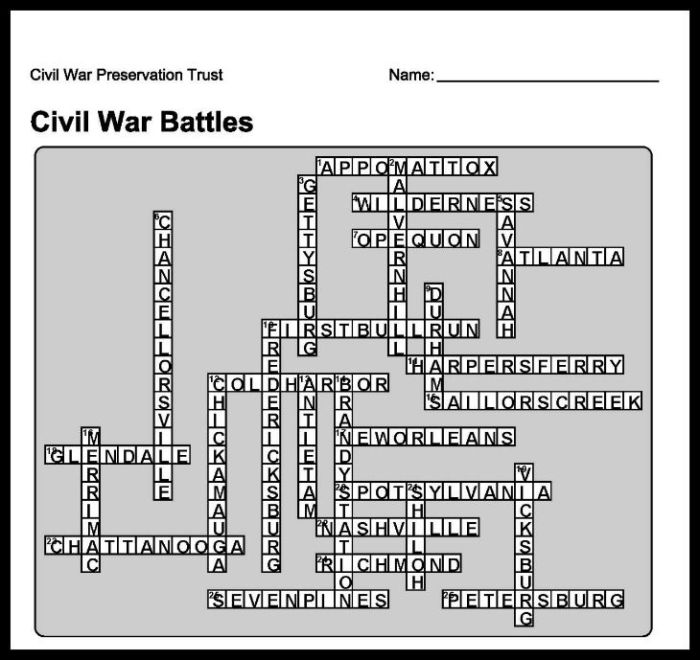Causes of the civil war crossword – Unravel the complexities of the Civil War through an interactive crossword puzzle journey! Explore the intricate web of economic disparities, slavery, political divisions, cultural differences, and key figures that ignited the flames of conflict. Dive into a world of historical intrigue and test your knowledge as you piece together the puzzle of the Civil War.
From the clash of agricultural and industrial economies to the contentious debates over states’ rights and secession, each clue unveils a facet of the conflict that shaped the destiny of a nation. Engage with the past as you uncover the hidden connections and motivations that led to one of the most pivotal moments in American history.
Causes of the Civil War: Overview: Causes Of The Civil War Crossword

The American Civil War was a complex conflict with numerous causes. Economic, social, and political tensions between the North and South had been building for decades, culminating in the outbreak of war in 1861.
The war was primarily fought over the issue of slavery, with the Northern states supporting its abolition and the Southern states determined to preserve it. However, other factors, such as economic disparities, political divisions, and cultural differences, also played a significant role.
Economic Differences
The North and South had distinct economic systems. The Northern economy was based on industry and manufacturing, while the Southern economy was based on agriculture, primarily the cultivation of cotton.
The industrial economy of the North was more diversified and grew rapidly. The South, on the other hand, was dependent on a single crop, cotton, which made it vulnerable to fluctuations in the global market.
Slavery, Causes of the civil war crossword
Slavery was the central issue that divided the North and South. The Northern states had largely abolished slavery, while the Southern states relied heavily on slave labor to maintain their plantation economy.
The North viewed slavery as a moral evil that violated the principles of equality and freedom. The South, however, defended slavery as a necessary institution for their economic survival and social order.
Political Divisions
Political divisions between the North and South intensified in the years leading up to the Civil War. The Northern states generally supported a strong federal government, while the Southern states advocated for states’ rights and the preservation of slavery.
The election of Abraham Lincoln as president in 1860, who was seen as an abolitionist, further escalated tensions and led to the secession of several Southern states from the Union.
Cultural Differences
The North and South also had distinct cultural identities. The North was more urbanized and cosmopolitan, while the South was more rural and traditional.
These cultural differences contributed to the growing divide between the two regions. The North viewed the South as backward and uncivilized, while the South saw the North as materialistic and corrupt.
User Queries
What were the main economic differences between the North and the South?
The North had a thriving industrial economy, while the South relied heavily on agriculture, particularly cotton production.
How did slavery contribute to the outbreak of the Civil War?
Slavery was a central issue in the conflict, with the North opposing its expansion and the South fighting to preserve it.
What role did political divisions play in the lead-up to the war?
Political divisions between the North and the South, particularly over states’ rights and secession, fueled tensions and contributed to the outbreak of war.